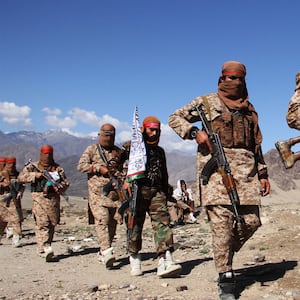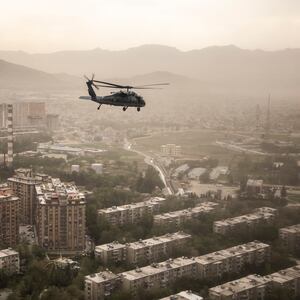KABUL—America’s war in Afghanistan featured all manner of bangs: IED blasts, car bombs, airstrikes, and the “mother of all bombs”—the most powerful non-nuclear ordnance ever used.
Its withdrawal from the country, on the other hand, is being conducted with the feeblest of whimpers.
For two decades, Bagram Air Force base was the centerpiece of the U.S. mission to clear out the Taliban and support the fledgling Afghan government. At its peak, it housed thousands of coalition troops. Its hangars were flush with the flashiest American aircraft, including F-16 fighter jets, giant C-130 cargo planes, and ferocious MD-530 attack helicopters.
And more than just a base, it was a symbol of the projection of American military power throughout the globe.
Now, it is scheduled to be handed over to the Afghan government on June 20 with as little fanfare as possible. There will be no elaborate ceremony, no visiting dignitaries with speeches about democracy and human rights. And most importantly for the departing forces: There will be no press.
Other once grand U.S. military installations, such as Kandahar Airfield or Camp Leatherneck in Helmand province, have already been completely abandoned. American allies in other provinces, such as the Germans in Mazar I Sharif, are following a similar blueprint.
Meanwhile, the Taliban is running amok. The group has taken the manner of the U.S. withdrawal as a sign that a long-awaited military victory could finally be on the horizon.
“We strongly believe the U.S. military was terribly defeated in Afghanistan,” Khalid Zadran, a Taliban media official, told The Daily Beast. “And they’re running away from Afghanistan in a hurry.” An ex-minister of the militant group described similar reactions: “Today the Taliban are in the highest military morale,” he said. “And Afghan soldiers are losing the enthusiasm to fight with the Taliban.”
The reason for the low-key exit? “The coalition forces are all just terrified of bad press, no one wants a ‘fall of Saigon’ photo opp,” one former British officer turned security consultant told The Daily Beast.
Forty years ago, a famous picture of the last helicopter evacuating staff from the U.S. embassy just before the fall of the South Vietnamese capital became a symbol of American defeat in Southeast Asia. The image haunted U.S policy makers for decades.
“In reality, it won’t look like that,” the officer added, “but the war and chaos here will just grind on for years.”
It has been just over two months since President Biden announced that he would follow through on Donald Trump’s promise for a complete withdrawal from the battered country. “It is time to end America’s longest war.” Rising violence in the country did little to dull his long-term skepticism of continued involvement in the conflict. He said that all U.S. troops would be out by the anniversary of the Sept. 11 attacks, but military officials expect they could be all gone as early as mid-July.
Biden’s decision to pull the plug was expected but dreaded by many Afghans. “We feel abandoned, and I no longer have any hope for our country,” Hamid Khawari, a 26-year-old Afghan teacher, told The Daily Beast at his home.
He is from the west Kabul neighbourhood of Dasht-e-Barchi, home to a large population of the minority Shia Hazaras. Now considered the most dangerous part of the Afghan capital, it has suffered from a series of bomb attacks over the last few months. A particularly monstrous blast at the Al-Shuhada girls’ school killed around 85 people.
Khawari was teaching at Al-Shuhada when the blast hit. Several of his students were killed in the carnage. He is a slim young man with angular features who speaks slow but deliberate English. “The situation just gets worse and worse, it feels like we are running on a treadmill, but getting nowhere,” he says, with his despondency written on his face as he struggles to articulate what his community has faced in Afghanistan.
A seemingly fruitless peace process originally sponsored by the Trump administration continues to spin its wheels in Doha, the capital of Qatar. While this initially raised hopes among the international community for a negotiated settlement in Afghanistan, those hopes have been dashed by the Taliban’s continued successes on the battlefield.
“We can assume the peace process is over. As time passes, the Taliban will grow more confident in their military strength because no serious harm is being inflicted on them to make them aware it could be an ugly war,” a European diplomat told The Daily Beast. “So there’s nothing to deter them from going down this road.”

They are reported to have taken over around a dozen districts in places like Laghman, Wardak and Helmand. They nearly took Lashkar Gah, the capital of the heavily contested Helmand province, just a few weeks ago.
The Afghan army and local police are often poorly trained, underfunded and suffer from a dearth of equipment. Many times, they have been reported to have deserted their posts when they come under attack from the determined insurgents.
Only the Afghan special forces, many of whom served alongside NATO at the height of the Obama administration's surge, remain equipped to take on the Taliban soldier for soldier. This has left them stretched painfully thin across the various battlegrounds.
“The false hope that the U.S. and NATO will never leave Afghans and won’t leave Afghanistan while the Taliban exists turned out to be our blunder,” one Afghan army officer told The Daily Beast. “The U.S. is leaving us, and we have very little time ahead to enhance our capability with the brutal Taliban.”
The Taliban, for their part, have been sounding a triumphant note. “If the Taliban carries on with the current military operations advancing for next two to three months, they will militarily astonish the world,” the ex-Taliban minister said. “[The U.S.] is not making much noise of withdrawal, but we watch them running short of looking at the rear.”
He added: “Losers never look back.”
This is an analysis echoed even by US allies. Tobias Ellwood, a former UK junior defense minister, admitted as much in a speech to the Royal United Services Institute. He said that despite 20 years of effort, Afghanistan will be left “in a worse state than we found it.”
But the U.S. and the world have largely moved on from the decades of carnage in Afghanistan. Biden told his fellow leaders at the G7 in Cornwall, England, that the U.S. was ‘back at the table’ to provide leadership on global affairs. He outlined a list of concerns the U.S. now sees as far more pressing than Afghanistan, including the vaccine rollout, cyberattacks from Russia and the rising menace of China. He did not mention Afghanistan once.
The deteriorating security situation has left U.S. officials scrambling to find ways to support the Afghan security forces from outside the country. The White House tried to spin this as neither victory nor defeat, saying that conditions in Afghanistan are now at a level where the terrorism threat can be “managed” from outside the country. In reality, analysts claim that there are hundreds of al Qaeda operatives still fighting from within the Taliban’s ranks.
The New York Times has reported that Pentagon officials have been drawing up contingency plans to send U.S. warplanes and drones to defend Afghan national forces should the Taliban advance threaten to capture key cities such as Kabul or Kandahar. Any serious support would require overflight permission and logistical support from surrounding countries.
But many of Afghanistan’s neighbors, who have close ties to regional rivals China and Russia, remain distrustful of the U.S. None has stepped forward with offers of future assistance. Central Commander General Frank Mackenzie told reporters that “It is our intention to continue to be able to go after al Qaeda and ISIS from over the horizon, from other locations in the theater.”
He claimed, perhaps optimistically, that “Afghanistan's neighbors share our desire to counter the scourge of global terrorism,” but also added that the U.S. had no agreements with these neighbors.
In the end, it seems, Afghanistan is being abandoned to a dark and uncertain future.





